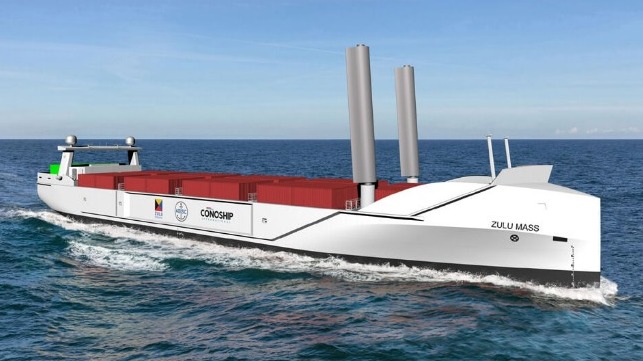Design for Autonomous, Short-Sea Vessel Adds Wind and Possibly Wave Power

A new project seeks to take advantage of the emerging regulations to support uncrewed vessels by developing what could become the first short-sea autonomous, zero-emission containership. Belgian company Zulu Associates and its subsidiary Anglo Belgian Shipping company working with Conoship updated their concept by adding auxiliary wind power while also exploring the feasibility of wave propulsion. The companies aim to launch their first vessel in 2025.
“We are challenging ourselves to build the most advanced and innovative vessel we can,” says Antoon Van Coillie, CEO of Zulu Associates. “As a result, apart from being fully electric and autonomous, we’re adding wind blades and examining wave foil propulsion. This is a very exciting time for short-sea shipbuilding where traditional concepts are being challenged, driving change and enabling new zero-emission possibilities.”
The company points to the fact that Belgium has a legal framework for pilot projects featuring uncrewed vessels in the North Sea. Belgium, the UK, Denmark, and the Netherlands have also signed a Memorandum of Understanding aiming to harmonize the procedures to obtain certification for ships without crews to sail between the four countries. Zulu looks to use this emerging framework to launch its vessel possibly crossing the English Channel.
“Autonomy is still in its infancy, but we want to show what is possible and support the process of regulation keeping pace with innovation,” says Van Coillie.
A year ago, the company received Approval in Principle from Lloyd’s Register for a 200 TEU autonomous, electric-powered containership. The new design called Zulu Mass now also features two wind blades for auxiliary power.
“A lot of attention was paid to the philosophy behind every part of the design,” the company said in its statement, “leading to an extremely well-thought-out design.” The Zulu Mass is a larger, seagoing design based on the company’s inland concept for a 90 TEU X-Barge that they report is currently completing its final construction design.
The Zulu Mass would be fully electric using a modular energy system in containers similar to the concepts being pursued for inland shipping where the power sources are swapped out so as not to delay the vessel waiting to recharge its energy source. Zulu envisions using either batteries and/or hydrogen-based power. As such the vessel would be zero-emission and they are adding in auxiliary wind power to improve efficiency while reporting they will investigate the feasibility of wave propulsion.

that matters most
Get the latest maritime news delivered to your inbox daily.
Several other projects are also exploring the opportunities for short-sea autonomous ships. Samskip is developing a concept for two containerships that would run between Norway and the Netherlands powered with hydrogen. In Norway, the Yara Birkeland has already begun testing and working through a multi-stage certification program that aims by as early as next year to be running autonomously on an inland route along with Norwegian grocery chain ASKO that is also testing barges that will operate autonomously crossing Oslofjord. Furniture manufacturer Ekornes announced it was partnering with German logistic company DB Schenker to develop an autonomous vessel that would sail a 23-mile route between the furniture company’s manufacturing facility and a shipping port. China reported it had commissioned the first autonomous, electric-powered container feeder ship in April 2022.
Short-sea shipping is seen as one of the promising first movers in autonomous shipping. At the same time, projects in Japan and South Korea are working to use similar technologies and have already tested the first applications of ocean-going vessels capable of autonomous navigation.
